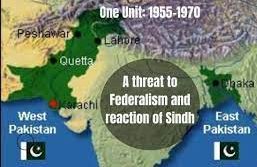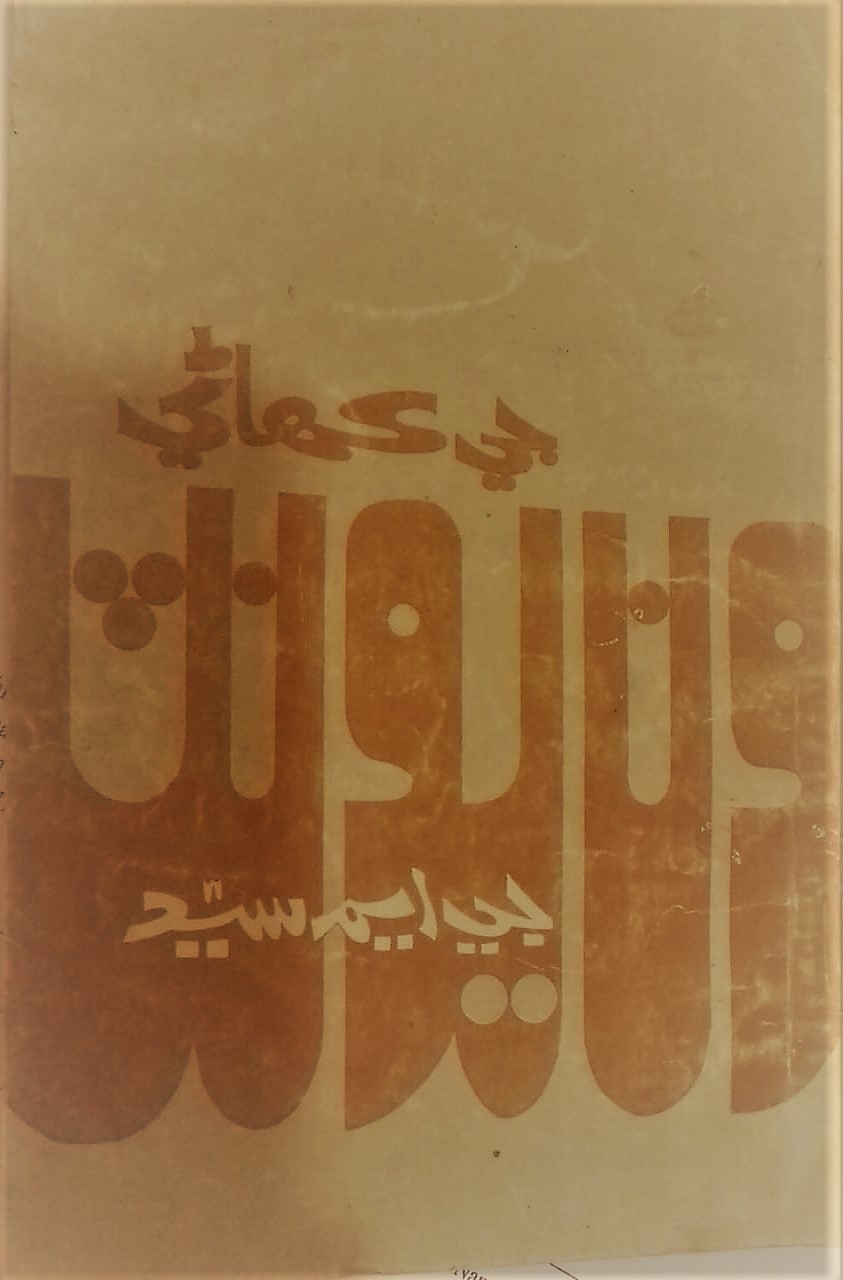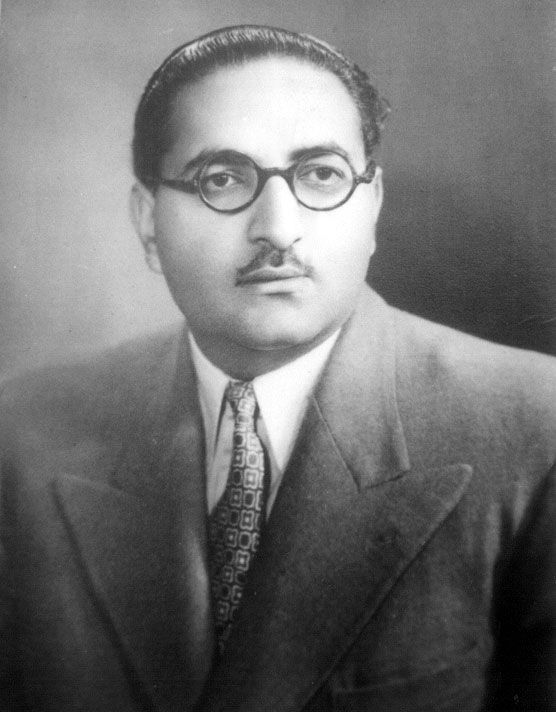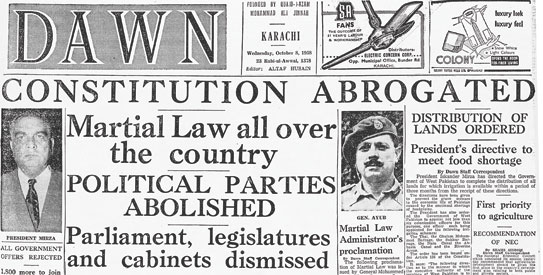
A group argued that the One Unit should be abolished and replaced by Zonal Federation wherein the Lieutenant Governors would be nominated in smaller provinces. This proposal was more dangerous.
Dr. Zaffar Junejo
(Author’s Note: One Unit was dissolved on 1st July, 1970. Sindhi nation along with Bengalis, Balochis, and Pathans fought against it through platforms of cultural associations, literary organizations and political parties. By and large One Unit was opposed across Pakistan however the Anti-One Unit Movement’s epicenter was Sindh. Sindh opposed One Unit because it was considered a tool to alter its demography, grab resources and strategically control wealth of the province. Sindhi nationalists, supported by other political parties forged an association to realize one point agenda – dismantle One Unit. They carried the struggle in all odd and even situations, and bore the cost – jails, punishments, insults, life threats and issuing of ‘certificates’ of disloyalty and treachery but they continued their struggles, and got it undone – Sindh was restored with its full name, and titles.
In 2020, an idea was floated by some Sindh-lovers that Sindh has to celebrate Anti-One Unit Abolition Day as the Golden Jubilee event, just to cherish, and recall the successful struggle of Sindhi peoples. In this regard, the author intends to translate some of the basic and most relevant documents from Sindhi language into English, in sprit of celebration and remembrance. The first in the series is Saeen GM Syed’s article: One Unit Jo Qiyam: Mukhalfan Ja Khadsha and Muwafqan Ja Faidi Mean Dalil (Formation of One Unit: Opponents’ Apprehensions and Supporters’ Arguments in its favor).

The article is taken from the booklet: One Unit Ji Kahani (The Story of One Unit). The book was authored by GM Syed and published by Yar Muhammad Ibin Hayat Panhwar, Secretary Sindh Mutaheda Mahaz, Markazi Office, Al-Khalil Building, Qazi Qayoum Road, Hyderabad. Its printer was Begum Zeenat Channa, ‘Zeenat Printers’ Khokhar Mahlo Hyderabad. Its first edition with 2000 copied came in November, 1969 – Dr. Zaffar Junejo.)
Formation of One Unit –IV
Opponents’ Apprehensions and Supporters’ Arguments in its favor
GM Syed
4) After the formation West Pakistan Assembly, we learned that through a well-hatched design, how prior to One Unit promises were being broken. Let me quote a few:
A) Sindh spent 80 crore for the construction of Kotri Barrage, but the land in its command area, particularly in Tando Muhammad, developed from the government funds, was allocated to non-Sindhis.
B) A considerable number of Sindhi officers’ seniority rights were violated and instead to uphold them, juniors from Punjab were promoted to supersede. The case in point is of Mr. Usman Ali Ansari, Mr. Dhakhan, Jaffar Ali, and lot of others who became victims of injustice.
C) Sindh government’s approved developed schemes for hilly areas, Thar Desert/ arid areas were rejected, although, Sindh Government was financer of these projects. It must be noted that at the time of the declaration of One Unit, Sindh’s saving was 30 crore. Afterwards, immediately the Central Government took the amount and utilized to serve its own interests.
D) Sindh Government’s approved schemes for ‘Sindhi Adabi Board’ and ‘Shah Latif Central Cultural Board’ were neglected, and they became just ‘schemes’ in official records.
E) Sindh Government’s annual plan and allocated budget for opening a high school in each taluka, and establishing of college and hospital in each district was rejected, and Sindh’s initiated program, ‘Zori Taleem’ (Forced Education) was stopped.

The grave injustice and exploitation also irritated some politicians of Punjab as well as the members of Muslim League Assembly Party. The prominent party members were Mian Muhammad Mumtaz Daulatana, Sardar Bahadur Khan, Abdul Qayum Khan, Qazi Essa and Khanbahadur Muhammad Ayub Khuhro. All of them worked with us to abolish One Unit. Later, ‘Republican Party’ that was in power, passed One Unit abolition bill in the West Pakistan Assembly. When the question to get the constitutional guarantee came in, they ditched us. Therefore, we formed Sindh-based Sindh Mutaheda Mahaz. I have written about it in my other political writings.
The imposition of the Martial Law (1958) worsened the situation. Literary, people rejected One Unit. The situation became so alarming that the government was compelled to constitute Justice Fazal Akabr Committee. Justice Fazal Akbar in one of his public statements declared that “97% of the residents of small provinces were not only angry with the One Unit, but they hated it.”
 However, it seemed from the actions and moves of the big province that its specific political gang still strived to achieve their permanent interests and believed in expansion. Therefore, they intended to keep One Unit. Till now they have maneuvered to keep intact One Unit and exploit small provinces. These were their applied tricks:
However, it seemed from the actions and moves of the big province that its specific political gang still strived to achieve their permanent interests and believed in expansion. Therefore, they intended to keep One Unit. Till now they have maneuvered to keep intact One Unit and exploit small provinces. These were their applied tricks:
- One group, for instance Convention Muslim League, and people like Choudhary Nazir Ahmed, openly supported One Unit. They retained it at all costs.
- Anther, a group of deceivers, argued that the constitution of 1956 (which is non-democratic) should be implemented, and then election for the constituent assembly should be held under it, and after that a due political process should be allowed to take its own course. They pleaded so, because they knew that the constitution of 1956, wouldn’t allow Bengalis to take the lead on the basis of population. On the contrary, from the West Pakistan the deputy collectors’ nominated from tribal agencies would be part of the assembly, and they would enjoy the same status and position, and they would follow the official line. In addition to that, according to the constitution of 1965, 2/3 majority was needed to amend it. Therefore, the supporters of One Unit were confident that they could buy loyalties of the some members of the East Pakistan, and small provinces. Consequently, this group thought to use fear and greed for the realization of their designs. Therefore, they were confident that One Unit would be retained and saved. The political parties which believed and supported this idea were Council Muslim League, PDP and Jamait Islami.
- Third group argued that the One Unit should be abolished, and it should be replaced by the Zonal Federation. According to Zonal Federation, the Lieutenant Governors would be nominated in smaller provinces, and they would be allowed to handle a few departments. However, other departments and more functions would be handled by West Pakistan Zonal Federation Assembly and Governors. This type of proposal was even more dangerous to One Unit. It was so, because the positions of lieutenant governors and ministries might be bribed for purchasing loyalties of representatives of the smaller provinces. In this way, they would be made part in their designs. Resultantly, problems, complaints and cries of small provinces would be ignored. This compromise and betrayal of representatives of smaller provinces would ultimately dilute the peoples’ struggle. Meanwhile, within short time ‘colonization’ process would be initiated and people would be shifted, this alteration in population would prove a full stop for small provinces’ struggles. The custodians and promoters of this idea were: Council Muslim League, PDP, Jamait Islami, and National Awami Party (Wali Khan Group) and Peoples’ Party also endorsed the idea of Zonal Federation.
- The fourth group was against One Unit, and willing to abolish it. However, their suggested ways and means were against the Awami League’s ‘six-points.’ At that time, it was one of the largest parties of East Pakistan. If we endorse the point of views of this group, and opposed ‘six-points’, then surely we lost the support of Awami League, and it was impossible to pass Anti-One Unit bill or abolish it without Awami League. The idea to criticize ‘six-points’ was promoted by above mentioned parties, however, National Awami Party (Wali Khan Group) and Peoples’ Party were also part of the campaign. In addition to that, these parties also encouraged and arranged to issue statements against the opinions and demands of Awami League, and in this way they created distrust among people of East Pakistan.
________________
 Dr. Zaffar Junejo has a Ph.D. in History from the University of Malaya. His areas of interest are post-colonial history, social history and peasants’ history.
Dr. Zaffar Junejo has a Ph.D. in History from the University of Malaya. His areas of interest are post-colonial history, social history and peasants’ history.
Click here for Part-I , Part-II, Part-III